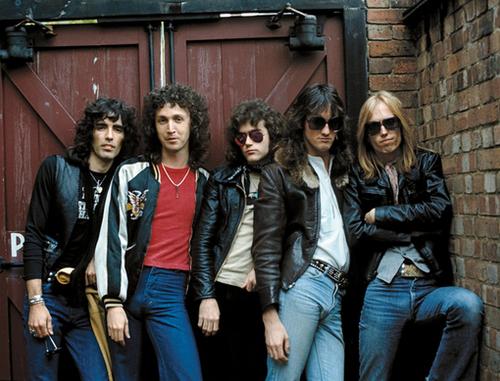

Shelter brokered an introduction between Petty and Iovine, and when Petty played him the demos of “Refugee” and “Here Comes My Girl,” Iovine was instantly sold. The Heartbreakers loved “Because the Night”-I mean, everyone loved it-and Lynch was particularly fond of Yakus’ drum sound on the record. It sounded great, too, thanks in large part to veteran engineer Shelly Yakus, whom Iovine loved. Knowing that Smith’s long-delayed third LP had no lead single, he coaxed Springsteen into giving Smith a skeletal tune he’d shelved-just a chorus, really-called “Because the Night.” Smith finished the song, and her scenery-chewing romantic mini-opera was easily her biggest hit. A few years later, Iovine signed on to produce Patti Smith’s third album Easter while he was engineering Springsteen’s Darkness on the Edge of Town. Springsteen’s insistence on perfecting Max Weinberg’s drum sound on the album-three weeks’ worth of insistent tracking and re-tracking-even forced Iovine to quit on one occasion. He wanted the third album to be different, and definitely bigger.įour years earlier at 21, he’d stumbled into engineering Born to Run and studied Bruce Springsteen’s studio perfectionism during some long sessions at New York City’s Record Plant.

Their second album You’re Gonna Get It! had gone gold, but Petty was tired of being a support act. Express-but had never headlined their own tour. In the previous few years, the Heartbreakers had opened for everyone from Blondie to Bob Seger, the Kinks, Al Kooper, Rush, even the jazz-rock ensemble Tom Scott and the L.A. They fit somewhere between spiky new wave, the blue-collar rock of Bob Seger and Bruce Springsteen, and the emergent crop of critically-beloved, acerbic UK traditionalists Elvis Costello, Nick Lowe, Graham Parker, and Joe Jackson.

#Tom petty and the heartbreakers mac
band, but without the slick, expensive sound of Fleetwood Mac and the Eagles. The Heartbreakers-guitarist Mike Campbell, keyboardist Benmont Tench, drummer Stan Lynch, and bassist Ron Blair-split the difference between a lot of styles: They weren’t massive UK art-rock or the arena-sized metal of AC/DC and Van Halen. Petty won again, and named the followup Hard Promises. Yet again, Petty threatened to withhold the LP-arguing that his label was trying to price-gouge his fans-or title it Eight Ninety-Eight. Having learned no lessons from testing Petty’s will, the label determined that the Heartbreakers now qualified for its unscrupulous “Superstar Pricing,” an increase from $8.98 to $9.98 already applied to big sellers like Steely Dan’s Gaucho and the Xanadu soundtrack from ELO and Olivia Newton-John. The band’s stardom was actually validated through MCA’s own blinkered corporate logic. 2 on the Billboard albums chart for seven weeks-kept from the top spot by Pink Floyd’s The Wall-and would eventually sell nearly three million copies.
#Tom petty and the heartbreakers cracked
After two studio albums, after “Breakdown” barely cracked the Top 40 and “American Girl” didn’t even chart, after four years in the industry mines and a few months of court battles, Tom Petty and the Heartbreakers had finally conquered the pop world. Thanks in large part to the studio wizardry of producer Jimmy Iovine and engineer Shelly Yakus, “Refugee,” “Don’t Do Me Like That,” and “Here Comes My Girl” sounded massive on FM radio. They get you pinned in a corner, and the last thing you can do to keep your sanity is write songs.” Especially for someone who specialized in songs about losers trying to get by, Torpedoes was a positively triumphant moment. ”We didn’t sit around and talk about making an album about that experience,” Petty told Rolling Stone in 1980, “but we knew we were. The album the Heartbreakers released that October, a day before Petty’s 29th birthday and four months after his Chapter 11 filing, was appropriately titled Damn the Torpedoes. It was a rare victory in a cutthroat business: a musician called a major label’s bluff and forced them to fold. They also returned to him all publishing rights and gave him his own boutique label, Backstreet. MCA kept Petty on contract, but it was now far more lucrative with significant creative latitude. Petty’s final blow was filing for bankruptcy, which opened his current contracts to renegotiation and signaled that he wasn’t about to flinch. Petty then privately told a studio assistant to hide each day’s reels in a secret location without his knowledge. Refusing to be “bought and sold like a piece of meat,” Petty threatened to shelve his band’s new album, and MCA counter-threatened to confiscate the band’s session tapes-legally, their property. When MCA bought Shelter’s fledgling parent company ABC in 1979, Petty tried to opt out of his contract-in which he’d naively ceded all publishing royalties-and MCA and Shelter sued him in L.A.


 0 kommentar(er)
0 kommentar(er)
